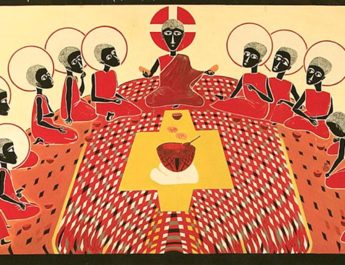Mark 10:35-45
Ordinary B47
35 JamesA and John,B theC sonsD of Zebedee,E came forwardF to him and said to him,
A “James” = Iakob. From Hebrew Yaaqov (Jacob); from the same as aqeb (heel, hind part, hoof, rear guard of an army, one who lies in wait, usurper). This is James, meaning heel grabber or usurper.
B “John” = Ioannes. From Hebrew yochanan (Johanan); from Yehochanan (“the Lord has been gracious”); {from YHVH (proper name of the God of Israel); {from havah (to become); from hayah (to be, exist, happen)} + chanan (beseech, show favor, be gracious; properly, to bend in kindness to someone with less status). This is John, meaning “the Lord has been gracious.”
C {untranslated} = duo. This is two or both.
D “sons” = huios. This is son, descendant – a son whether natural born or adopted. It can be used figuratively for other forms of kinship.
E “Zebedee” = Zebedaios. Related to “John” in v35. 12x in NT. From Hebrew zebadyah (Zebadiah, “The Lord has bestowed”); {from Zabad (to bestow, confer, endure) + Yah (God, the Lord; a shortening of the sacred name of the God of Israel); {from YHVH (see note B above)}. This is Zebedee, meaning “the Lord has bestowed.”
F “came forward” = prosporeuomai. 1x in NT. From pros (at, to, toward, with) + poreuomai (to go, travel, journey; transportation something from one place to another; focuses on the personal meaning given to getting to the destination); {from poros (passageway, ford)}. This is to come near, approach, journey towards.
“Teacher,G we wantH you to doI for us whatever we askJ of you.”
G “Teacher” = Didaskalos. From didasko (to teach, direct, instruct, or impart knowledge; in the New Testament, almost always used for teaching scripture); from dao (to learn). This is teacher or master.
H “want” = thelo. This is to wish, desire, will, or intend. It is to choose or prefer in a literal or figurative sense. It can also mean inclined toward or take delight in. It can have a sense of being ready to act on the impulse in question.
I “do” = poieo. This is to make, do, act, construct, abide, or cause.
J “ask” = aiteo. This is to ask, demand, beg, desire.
36 And he said to them, “What is it you want me to do for you?”
37 And they said to him, “GrantK us to sit,L oneM at your right handN and one at your left,O in your glory.”P
K “grant” = didomi. To give, offer, place, bestow, deliver. This is give in a literal or figurative sense.
L “sit” = kathizo. From kathezomai (to sit down, be seated); {from kata (down, against, according to, among) + hezomai (to sit); {from aphedron (a seat, a base)}}. This is to sit, set, appoint, stay, rest.
M “one” = heis. This is one, a person, only, some.
N “right hand” = dexios. Perhaps from dechomai (to warmly receive, be ready for what is offered, take, accept, or welcome; to receive in a literal or figurative sense). This is right, right side, or the right hand.
O “left” = aristeros. 4x in NT. From aristos (best). This is better, used figuratively to refer to the left or left hand side.
P “glory” = doxa. From dokeo (to have an opinion, seem, appear, suppose; a personal judgment; to think); from dokos (opinion). This is literally something that evokes a good opinion – something that connects to our understanding of intrinsic worth. The ultimate expression of this is, of course, God and God’s manifestation. So, this is opinion, honor, and dignity, but also praise, glory, renown, and worship.
38 But JesusQ said to them, “You do not knowR what you are asking. Are you ableS to drinkT the cupU that I drink, or be baptizedV with the baptismW that I am baptized with?”
Q “Jesus” = Iesous. Related to “John” and “Zebedee” in v35. From Hebrew Yehoshua (Joshua, the Lord is salvation); {from YHVH (see note B above)} + yasha (to deliver, defend, help, preserve, rescue; properly, to be open, wide or free, which implies being safe. So, in a causative sense, this is to free someone)}. This is Jesus or Joshua in Greek – the Lord saves or the Lord is salvation.
R “know” = eido. This is to know, consider perceive, appreciate, behold, or remember. It means seeing with one’s eyes, but also figuratively, it means perceiving – seeing that becomes understanding. So, by implication, this means knowing or being aware.
S “are…able” = dunamai. This is to be able, or something that is possible. It can also be empowered or being powerful. The Greek word for “miracle” (dunamis) comes from this root.
T “drink” = pino. This is to drink, literally or figuratively.
U “cup” = poterion. Related to “drink” in v38. From pino (see note T above). This is a drinking vessel. Figuratively, it can refer to one’s lot, to fate, or to what God has in store for you.
V “baptized” = baptizo. Related to “baptism” in v38. See note W below.
W “baptism” = baptisma. From baptizo (to submerge, wash, or immerse; used specially for baptism); from bapto (to dip or dye; to entirely cover with liquid, to stain). This is dipping or sinking. Also, the rite of baptism.
39 They replied, “We are able.”
Then Jesus said to them, “The cup that I drink you will drink; and with the baptism with which I am baptized, you will be baptized; 40 but to sit at my right hand or at my leftX is not mine to grant, but it is for those for whom it has been prepared.”Y
41 When the ten heardZ this, they beganAA to be angryBB with James and John.
X “left” = euonumos. 9x in NT. From eu (good, well, rightly) + onoma (name, authority, cause, character, fame, reputation; thought to include something of the essence of the person and not separate from the person); {may be from ginosko (know, recognize, learn from firsthand experience)}. This is literally well-named or of a good name. It refers to the left or left side.
Y “prepared” = hetoimazo. From hetoimos (make ready, be ready because of being prepared, standing by, adjusted; ready to meet some opportunity or challenge). This is to prepare or provide.
Z “heard” = akouo. This is hear or listen, but it also means to understand by hearing. This is where the word “acoustics” comes from.
AA “began” = archomai. From archo (to rule, begin, have first rank or have political power). This is to begin or rule.
BB “be angry” = aganakteo. 7x in NT. Perhaps from agan (much) + achthos (grief); {related to agkale (bent arm); from agkos (bend, ache)}. This is being greatly grieved or displeased. Generally translated angry or indignant.
42 So Jesus calledCC them and said to them, “You know that among the GentilesDD those whom they recognizeEE as their rulersFF lord it overGG them,
CC “called” = proskaleo. From pros (at, to, toward, with) + kaleo (to call by name, invite, to name, bid, summon, call aloud); {related to keleuo (to command, order, direct); from kelomai (to urge on)}. This is to call to oneself, summon.
DD “Gentiles” = ethnos. Probably from etho (a custom or culture). This is people who are united by having similar customs or culture. Generally, it is used to refer to Gentiles. This is a tribe, race, nation, or Gentiles in general. This is where the term “ethnicity” comes from.
EE “recognize” = dokeo. Related to “glory” in v37. See note P above.
FF “rulers” = archo. Related to “began” in v41. 2x in NT. See note AA above.
GG “lord…over” = katakurieuo. 4x in NT. From kata (down, against, among, throughout) + kurieuo (to rule, have authority or dominion); {from kurios (a respectful address meaning master or sir. It refers to one who has control or power greater than one’s own. So, it was also applied to God and Jesus as Master or Lord); from kuros (authority, supremacy)}. This is to exercise lordship authority, over dominion. It can also mean to overpower or master. It is having control and authority for that control. Generally the negative sense of control – to subjugate.
and their great onesHH are tyrants overII them. 43 But it is not so among you; but whoever wishesJJ to becomeKK great among you must be your servant,LL
HH “great ones” = megas. This is big in a literal or figurative sense – great, large, exceeding, abundant, high, mighty, perfect, strong, etc.
II “are tyrants over” = katexousiazo. 2x in NT– here and in the parallel in Matthew 20:25. From kata (down, according to, by way of) + exousiazo (to wield power or authority over, to master or control; to have authority to act); {from exousia (power to act or weight; denotes moral authority or influence; can mean domain, liberty, freedom, capacity, mastery, right, force, or strength); {from exesti (to be permitted or lawful); {from ek (out, out of) + eimi (to be, exist)}}. This is having power or authority over – to use authority oppressively, to dominate or bring down.
JJ “wishes” = thelo. Same as “want” in v35. See note H above.
KK “become” = ginomai. This is to come into being, to happen, become, be born. It can be to emerge from one state or condition to another or is coming into being with the sense of movement or growth.
LL “servant” = diakonos. Perhaps from dia (through, across to the other side, thoroughly) + konis (dust) OR from dioko (to chase after, put to flight; by implication, to persecute or to purse like a hunter after its prey; this can be earnestly pursue or zealously persecute) {related to dio (put to flight)}. This is a servant, minister, waiter, or attendant. It is used for a person who performs a service, including religious service. This is the root of the word “deacon.”
44 and whoever wishes to be firstMM among you must be slaveNN of all. 45 For the Son of ManOO came not to be servedPP but to serve,
MM “first” = protos. From pro (before, first, in front of, earlier). This is what is first, which could be the most important, the first in order, the main one, the chief.
NN “slave” = doulos. Perhaps from deo (to tie, bind, fasten, impel, compel; to declare something against the law or prohibited). This is used for a servant or for a slave, enslaved. It refers to someone who belongs to someone else. But, it could be voluntary (choosing to be enslaved to pay off debt) or involuntary (captured in war and enslaved). It is used as a metaphor for serving Christ. Slavery was not inherited (i.e. the children of slaves were not assumed to be slaves) and slaves could buy their way to freedom. Slavery was generally on a contractual basis (that is for the duration of how long it took you to pay your debt and/or save up enough money to buy your freedom).
OO “Man” = anthropos. Probably from aner (man, male, husband) + ops (eye, face); {from optanomai (to appear, be seen); perhaps from horao (become, seem, appear)}. This is human, humankind. Used for all genders.
PP “be served” = diakoneo. Related to “servant” in v43. From diakonos (see note LL above). This is to wait at table, to serve generally, to minister or administer, to be in the office of deacon. To wait on someone as a slave, friend, or host.
and to giveQQ his lifeRR a ransomSS for many.”TT
QQ “give” = didomi. Same as “grant” in v37. See note K above.
RR “life” = psuche. From psucho (to breathe, blow). This is breath, the breath of life, the self, individual, soul. This is the word for that which makes a person unique – their identity, will, personality, affections. This isn’t the soul as the immortal part of us, but as our individuality. It is also not life as a general concept, but specific to people. This is where the words psyche and psychology come from.
SS “ransom” = lutron. 2x in NT. From luo (to loose, release, untie; figuratively, to break, destroy, or annul; releasing what had been withheld). This is ransom, the money used to free slaves. It is also a sacrifice of expiation. Figurative, it can mean atonement.
TT “many” = polus. This is much, often, plenteous – a large number or a great extent.
Image credit: “Jesus Threatened with being Stoned” by LUMO Project.




